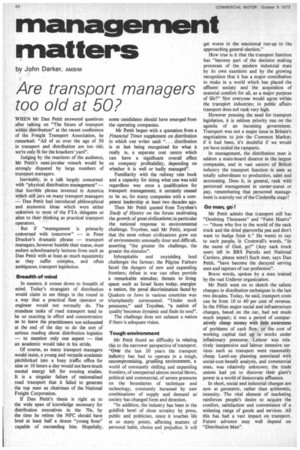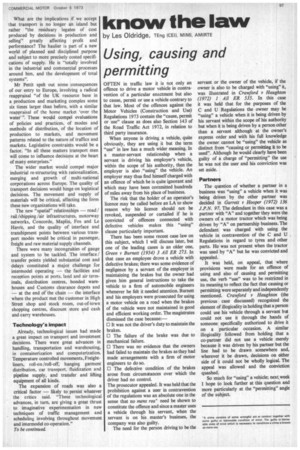management matters
Page 98

Page 99

If you've noticed an error in this article please click here to report it so we can fix it.
by John Darker, ArviBim
Are transport managers too old at 50?
WHEN Mr Dan Pettit answered questions after talking on "The future of transport within distribution" at the recent conference of the Freight Transport Association, he remarked: "All of us over the age of 50 in transport and distribution are too old; we're only fit for the knackers' yard".
Judging by the reactions of the audience, Mr Pettit's semi-jocular remark would be strongly disputed by large numbers of transport managers. Inevitably, in a talk largely concerned with "physical distribution management" — that horrible phrase invented in America which still jars on many transport managers — Dan Pettit had introduced philosophical and economic ideas which were either unknown to most of the FTA delegates or alien to their thinking as practical transport operators.
But if "management is primarily concerned with tomorrow" — in Peter Drucker's dramatic phrase — transport managers, however humble their status, must endure schoolmasterly lectures from such as Dan Pettit with at least as much equanimity as they suffer complex, and often ambiguous, transport legislation.
Breadth of mind
In essence, it comes down to breadth of mind. Today's strategists of distribution would claim to see things in the round in a way that a practical fleet operator or engineer would not normally do. The mundane tasks of road transport tend to be so exacting in effort and concentration as to leave the practitioners too exhausted at the end of the day to do the sort of serious reading about distribution logistics — to mention only one aspect — that an academic would take in his stride.
Of course, as many transport managers would insist, a young and versatile academic pitchforked into a busy traffic office for nine or 10 hours a day would not have much mental energy left for evening studies. It is a singular failure of nationalised road transport that it failed to generate the top man as chairman of the National Freight Corporation.
If Dan Pettit's thesis is right as to the wide span of knowledge necessary for distribution executives in the 70s, by the time he retires the NFC should have bred at least half a dozen "young lions" capable of succeeding him. Hopefully, some candidates should have emerged from the operating companies.
Mr Pettit began with a quotation from a Financial Times supplement on distribution in which one writer said: ". . . distribution is at last being recognized for what it really is, a separate cost centre which can have a significant overall effect on company profitability, depending on whether it is well or badly managed".
Familiarity with the railway rate book and a capacity for doing what one was told regardless was once a qualification for transport management; it certainly ceased to be so, for many companies with a competent leadership at Least two decades ago.
Then Mr Pettit quoted from Toynbee's Study gf History on the forces motivating the growth of great civilizations; in particular the national response to environmental challenge. Toynbee, said Mr Pettit, argued that the most robust civilizations grew out of environments unusually dour and difficult, asserting "the greater the challenge, the greater the stimulus".
Inhospitable and unyielding land challenges the farmer; the Pilgrim Fathers faced the dangers of new and expanding frontiers; defeat in war can often provide a remarkable stimulus; threats to living space such as Israel faces today, energize a nation, the penal discrimination faced by Quakers or Jews in various countries was triumphantly surmounted. "Under such pressures," said Toynbee, "a nation of quality becomes dynamic and finds its soul".
The challenge does not exhaust a nation if there is adequate vision.
Tough environment
,Mr Pettit found no difficulty in relating this to the narrower perspective of transport. "Oyer the last 20 years the transport industry has had to operate in a tough, uncompromising, gruelling environment, a world of constantly shifting and expanding frontiers, of unexpected almost mortal blows, political and commercial, of severe pressures on the boundaries of technique and technology, constantly harassed by new combinations of supply and demand as society has changed form and direction.
"In addition, the industry has been in the goldfish bowl of close scrutiny by press, public and politician, since it touches life at so many points, affecting matters of personal habit, choice and prejudice. It will get worse in the emotional run-up to the approaching general election."
How true is it that the transport function has "become part of the decision making processes of the modern industrial state by its own exertions and by the growing recognition that it has a major contribution to make in a world which has placed the affluent society and the acquisition of material comfort for all, as a major purpose of life?" Not everyone would agree within the transport industries; in public affairs transport does not rank very high.
However pressing the need for transport legislation, it is seldom priority one on the agenda of an incoming government. Transport was not a major issue in Britain's negotiations to join the Common Market; if it had been, it's doubtful if we would yet have scaled the ramparts.
In management, the distribution man is seldom a main-board director in the largest companies, and in vast sectors of British industry the transport function is seen as totally subordinate to production, sales and accounting. Does it, in general, rank with personnel management in career-status or pay, remembering that personnel management is scarcely out of the Cinderella stage?
Go man, go !
Mr Pettit admits that transport still has "Doubting Thomases" and "Faint Hearts" — "those who live in the world of the sack truck and the dried marrowfat pea and don't want to budge from it." He wants to say to such people, in Cromwell's words, "In the name of God, go!" (Any sack truck users left in BRS Parcels and National Carriers, please note!) Such men, says Dan Pettit, "have become the decayed serving men and tapsters of our profession".
Brave words, spoken by a man trained by the vast Unilever organization.
Mr Pettit went on to sketch the salient changes in distribution techniques in the last two decades. Today, he said, transport costs can be from 10 to 40 per cent of revenue. In the Fifties major social and infrastructure changes, based on the car, had not made much impact; it was a period of comparatively cheap money with little awareness of problems of cash flow, Qr the cost of working capital tied up in stocks under inflationary pressures. Labour was relatively inexpensive and labour intensive services such as transport were reasonably cheap. Land-use planning associated with social-cost-benefit analysis, and commercial ones, was relatively unknown; the trade unions had yet to discover their giant's power in a world of democratic affluence.
• In short, social and industrial changes are now at geometric, rather than arithmetic, intensity. The vital element of marketing reinforces people's desire to acquire the comfort, satisfaction and convenience of a widening range of goods and services. All this has had a vast impact on transport. Future advance may well depend on "Distribution Man". What are the implications if we accept that transport is no longer an island but rather "the residuary legatee of cost produced by decisions in production and selling" greatly affecting profit and performance? The haulier is part of a new world of planned and disciplined purpose ana subject to more precisely costed specifications of supply. He is "totally involved in the industrial and commercial processes around him, and the development of total systems".
Mr Pettit spelt out some consequences of our entry to Europe, involving a radical reappraisal "of the UK resource base in a production and marketing complex some six times larger than before, with a similar reappraisal of the home market 'over the water'. These would com$1 evaluations of policies and practices, of modes and methods of distribution, of the location of production to markets, and movement patterns related to the nature of traffics and markets. Legislative constraints would be a factor. "In all these matters transport men will come to influence decisions at the heart of many enterprises."
The wider market would compel major industrial re-structuring with rationalization, merging and growth of multi-national corporations across Europe. The quality of transport decisions would hinge on logistical decisions. The movement and supply of materials will be critical, affecting the form these new organizations will take.
The new "spatial" relationships — road/ rail /shipping /air infrastructures, motorway networks, Concorde, Maplin, Fos and Le Havre, and the quality of interface and transhipment points between various transport modes would be critical in passenger, freight and raw material supply channels.
There were many incongruities of gauge and system to be tackled. The interface! transfer points yielded substantial cost and delays constituted a major challenge for intermodel operating — the facilities and reception points at ports. land and air terminals, distribution centres, bonded warehouses and Customs clearance depots and — at the end of the chain — the interface where the product met the customer in High Street shop and stock room, out-of-town shopping centres, discount store and cash and carry warehouses.
Technology's impact
Already, technological issues had made a great impact on transport and investment decisions. There were great advances in handling, transportation and warehousing, in containerization and computerization. Temperature controlled movements, Freightliners, roll-on /roll-off, hanging garment distribution, car transport. fluidization and pipeline supply, and transfer and lifting equipment of all kinds.
The expansion of roads was also a critical factor — likely to persist whatever the critics said. "These technological advances, in turn, are giving a great thrust to imaginative experimentation in new techniques of traffic management and scheduling involving throughout movement and intermodel co-operation."
To be continued
















































































































































